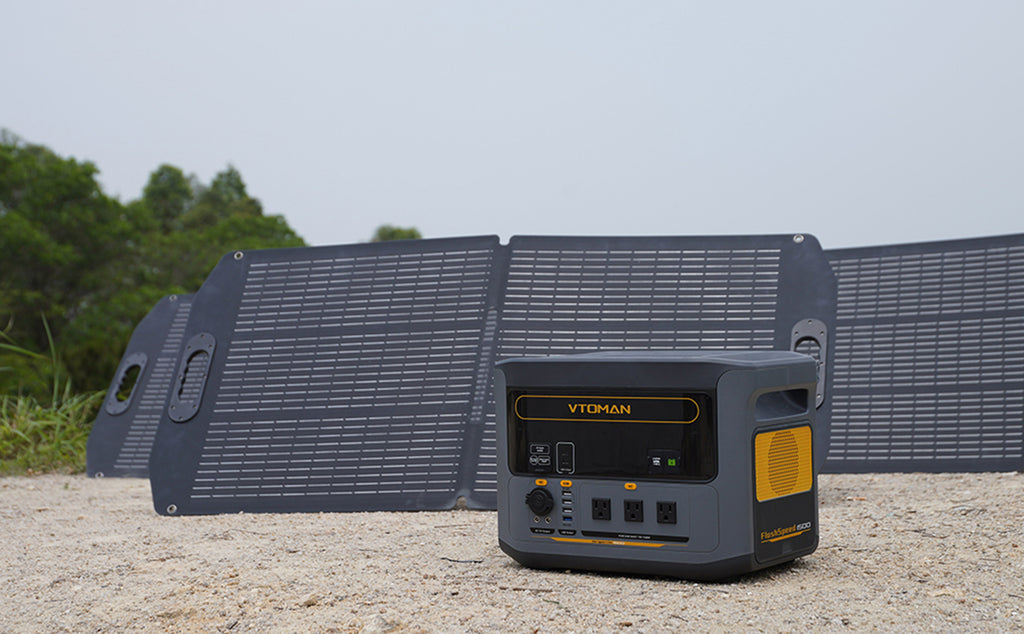Quick Answer: Yes, solar generators are a worthwhile investment. They provide a sustainable source of energy, significant long-term savings, and the convenience of portability and low maintenance. Despite the high upfront cost and reliance on weather conditions, their benefits, including environmental friendliness and adaptability to various power needs, make them an advantageous choice for both outdoor and backup home use.
In the time where renewable energy sources are increasingly pivotal, solar generators have served as a significant player. Today, we'll explore what solar generators are, their advantages and disadvantages, and identify the best solar generator from VTOMAN.
What Is a Solar Generator?
A solar generator is a system that converts sunlight into electrical energy, storing it in a battery for later use. It typically comprises solar panels, a charge controller, a battery, and an inverter. The solar panels capture sunlight, converting it into DC electricity. The charge controller regulates the flow of electricity to the battery, preventing overcharging. The stored electricity can then be converted into AC power through the inverter, making it usable for household appliances and electronic devices.

Advantages of Solar Generators
-
Eco-Friendly Impact: Solar generators harness the sun's power to produce clean, renewable energy. This process significantly slashes the carbon footprint associated with traditional energy sources, contributing to a greener planet. By converting sunlight into electricity without emitting harmful pollutants, solar generators present an environmentally sustainable alternative that aligns with global efforts to combat climate change.
-
Long-Term Cost Savings: Although the initial setup cost of traditional solar generators might seem daunting, they are a smart investment in the long run. After overcoming the hurdle of upfront expenses, users can enjoy a substantial reduction in electricity bills. Over time, the cost of harnessing sunlight diminishes to nearly zero, offering free energy that can lead to significant savings, especially in areas with high electricity rates or for those looking to power off-grid locations.
-
Economical Alternatives: Moreover, it's noteworthy that portable solar generators represent a more economical option. While the cost for a traditional solar power system can easily range into several thousands of dollars, portable solar generators are markedly less expensive. Prices for these mobile units start from as low as $200 and can go up to approximately $2,000 for higher-end models. This price variance makes portable solar generators an attractive alternative for those seeking the advantages of solar power without the steep initial costs associated with comprehensive, stationary systems.
-
Portability and Versatility: Designed with mobility in mind, many solar generator models are lightweight and compact, making them perfect for a wide range of outdoor activities. Whether it's for camping in the wilderness, hosting events in remote locations, or providing emergency power during outages, solar generators offer a dependable power source. This versatility ensures that clean energy can be accessed anywhere the sun shines, providing a level of convenience that traditional generators cannot match.
-
Minimal Maintenance Requirements: Unlike their fossil-fuel-powered counterparts, solar generators demand very little upkeep. The absence of moving parts reduces wear and tear, limiting maintenance mostly to the periodic cleaning of solar panels. This stark contrast to the ongoing fuel refills, oil changes, and mechanical servicing required by conventional generators not only saves time but also cuts down on long-term maintenance costs.

Disadvantages of Solar Generators
-
Weather Dependency: Solar generators rely on sunlight to generate electricity, making their efficiency susceptible to weather conditions. On cloudy or rainy days, the energy output can significantly decrease, leading to reduced performance. This variability requires users to plan accordingly, possibly necessitating larger battery storage or backup power sources to ensure a consistent energy supply during less sunny periods.
-
Limited Power Capacity: The ability of solar generators to power appliances is directly tied to their size and the energy stored in their batteries. Smaller models might struggle to meet the energy demands of numerous appliances simultaneously or to provide power for extended periods without sunlight. This limitation underscores the importance of accurately assessing energy needs and potentially investing in larger, more capable systems for those requiring more robust power solutions.
Best Solar Generators for 2024
The FlashSpeed 1500, complemented by a 1548Wh Extra Battery and a 400W Solar Panel, stands out as the best solar generator for 2024. This comprehensive system showcases a potent 1500W output power, which can surge up to 3000W, catering to a wide range of power needs. The ability to expand the system's capacity from 1548Wh to an impressive 3096Wh by integrating an extra battery makes it remarkably versatile. This feature ensures extended run times for various devices, making it an ideal choice for prolonged use during outdoor adventures, home backup, or any scenario requiring a reliable power source.

Incorporating the VTOMAN 400W solar panel, which utilizes monocrystalline silicon solar cells, the FlashSpeed 1500 harnesses sunlight with up to 23% efficiency. This high level of efficiency ensures more effective charging even in less-than-ideal sunlight conditions. The generator's UPS function, with a switchover time of less than 20ms, promises an uninterrupted power supply, crucial for sensitive devices like CPAP machines and refrigerators during power outages. Moreover, its capability for fast recharging-fully charging in about an hour with a maximum of 1500W input-means minimal downtime and enhanced convenience. The inclusion of a LiFePO4 battery, boasting over 3,100 life cycles to 80%, underscores the system's durability and long-term reliability, marking it as a top contender in solar generators for the upcoming year.
FAQs about Solar Generators
1. How do I know what size solar generator I need?
To determine the size, add up the wattage of all devices you plan to power. Look at the labels or manuals of your devices for their power requirements, sum these values, and choose a generator with a higher output to ensure it can handle the load, considering both peak and continuous power demands.
2. What size solar generator do I need for camping?
For camping, a 500-watt solar generator is typically sufficient. This size can charge mobile devices, power small appliances, and provide lighting, making it ideal for most camping activities without the bulkiness of larger units.
3. What size solar generator do I need for off-grid living?
A few thousand watts, generally starting at 3,000 watts, are needed for off-grid living. The exact capacity depends on your daily power usage, including lighting, refrigeration, cooking, and other household appliances. Calculating your total daily watt-hours will guide you in selecting the right size.
4. What size solar generator will run a house?
A solar generator with a capacity of over 10,000 watts is required to run a typical house. This capacity is necessary to support a wide range of household appliances and systems throughout the day and night, including peak usage times.
5. What will a 1000 watt solar generator run?
A 1000 watt solar generator can power basic devices such as lights, small appliances, and charge electronics. It's suitable for light use, including outdoor activities or as a backup for a few small devices during power outages.
6. Will a 2000 watt solar generator run a refrigerator?
Yes, a 2000 watt solar generator can run a refrigerator, but its ability to power the fridge continuously depends on the fridge's energy consumption and what other devices are being powered simultaneously.
7. How long will a solar generator power a refrigerator?
A 2000 watt generator can typically power a refrigerator for about 24 hours, depending on the fridge's efficiency, size, and the ambient temperature, which affects how hard the fridge must work to stay cool.
8. What can a 3000-watt solar generator run?
A 3000-watt solar generator can run larger appliances, including air conditioners, microwaves, and washing machines, making it suitable for more extensive needs such as emergency home power or off-grid living.
9. Do solar generators work on cloudy days?
Solar generators do work on cloudy days but at reduced efficiency. The solar panels can still capture sunlight, but the power output will be lower than on sunny days, affecting the amount of energy stored and available for use.
10. Can a solar generator work at night?
Yes, solar generators can work at night using the energy stored in their batteries. The capacity of the batteries and the energy consumption of connected devices will determine how long the generator can provide power without sunlight.
11. What is the lifespan of a solar generator?
Solar panels can last about 25 years, while batteries have a lifespan of 5-10 years, depending on the battery type and usage. Regular maintenance and proper usage can extend the life of the entire solar generator system.
12. Can I run a solar generator 24/7?
Yes, a solar generator can be run 24/7 if it's properly sized for your energy needs and the batteries are adequately charged during the day. Continuous operation requires careful management of energy consumption and sufficient solar panel capacity to recharge the batteries daily.
13. How many solar panels do I need for a solar generator?
The number of solar panels required depends on your daily energy usage and the sunlight your location receives. Calculate your daily power consumption in kilowatt-hours (kWh) and compare this with the output of the solar panels, considering local peak sun hours to determine the total panel capacity needed.
14. Do solar panels work with moonlight?
Solar panels cannot effectively generate electricity with moonlight. Moonlight, being reflected sunlight, has significantly less energy and is not sufficient to activate solar panels to produce electricity meaningfully.
Read More
- What Features Should the Best Portable Power Station Have? – VTOMAN
- Portable Power Stations: Reliable Power for DJs – VTOMAN
- Get Ready for Member Day: Shop and Save with VTOMAN!
- Should I Buy or Rent a Portable Generator? – VTOMAN
- 5 Compelling Reasons Why You Need Portable Power Stations for RVs – VTOMAN












